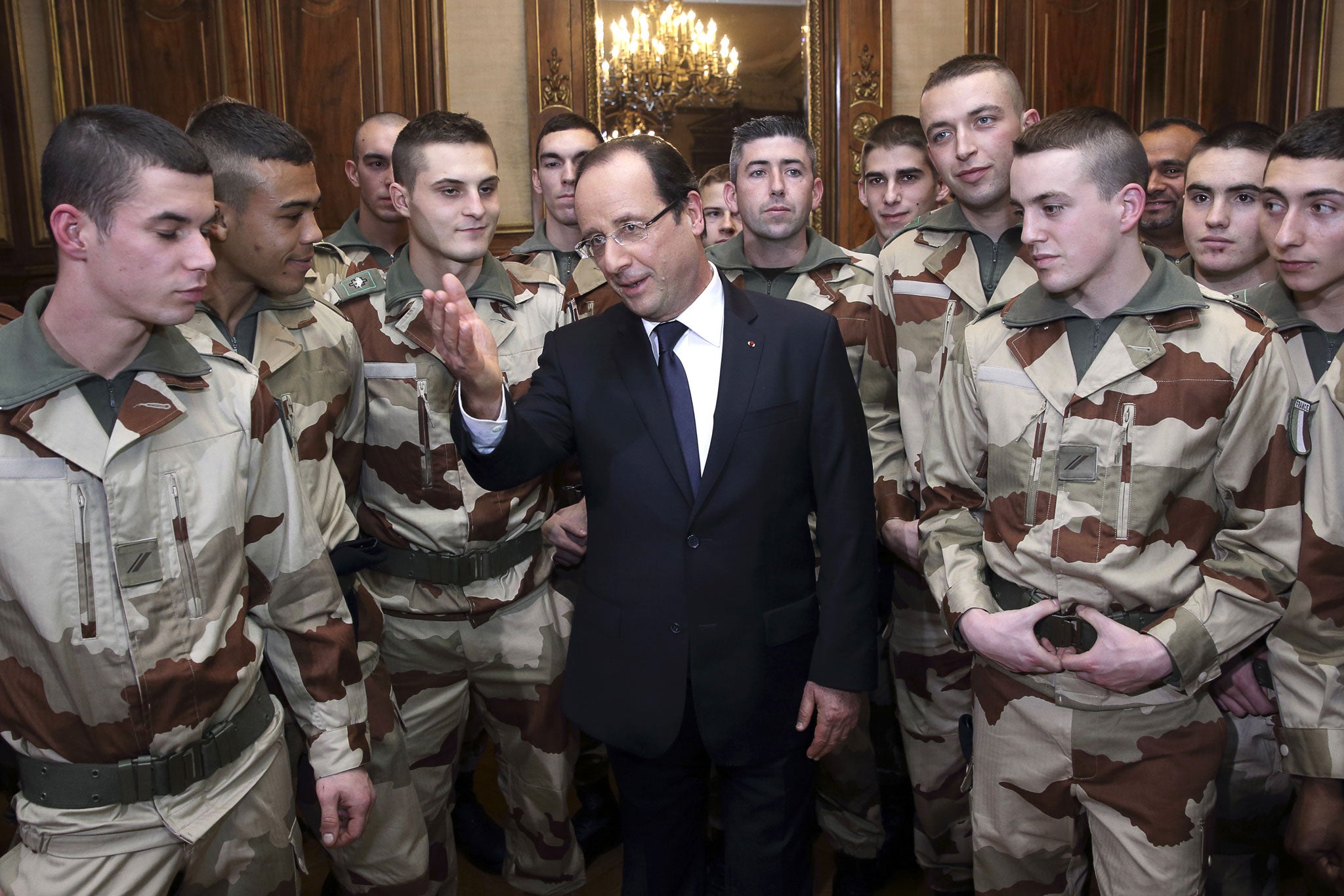From Mr Normal to chef-de-guerre: How President Hollande found his appetite for leadership
After an uncertain start, intervention in Mali has bucked the President's approval ratings

They used to call him “Flanby”.
It is a nickname François Hollande has always despised, likening him to the soft and creamy dessert which has since become a byword in France for weakness or incompetence.
In the months that followed his election victory in May the nickname – and its slightly less derisive counterpart, Mr Normal - were justified. Although the French President’s no-nonsense campaign and rhetoric of change had plenty of bark, there was little bite when it came to key policies. He was even forced to retreat with his tail between his legs after his proposal to slap a 75 per cent tax on the rich was slapped down as unconstitutional by the highest court in France.
Then there were other gaffes which left him less than impressive in the public eye. Last November the chef d’état was mocked on an international scale for mistakenly signing a congratulatory letter to President Obama “Friendly, François Hollande.” Hot on the heels of this faux pas came the revelation that Gérard Depardieu, one of the most well paid actors in France, had balked at the government’s new tax proposals and waddled off to Belgium, before threatening to send back his passport.
Perhaps the worst hammer blow to Hollande’s popularity came when he was forced into a humiliating retreat from his bid to nationalize two key furnaces in France’s ailing steel industry. Alternatively, it might have been the moment his own Labour Minister fumed that “France is totally broke,” completing undermining the President’s “tax and spend” policy.
Or could it actually have been last December, when almost a million people railed against his new gay marriage bill in the streets of Paris? There are almost too many possibilities to choose from.
Yet out of this omnishambles of gaffes, u-turns and celebrity tantrums emerged a change of fortune that no one could have predicted. On January 11th, Hollande suddenly dispatched a fleet of attack helicopters and fighter jets to bombard Islamist rebels marching on Bamako in Northern Mali. Since then France’s progress has been steady with the cities of Gao, Timbuktu - and now Kidal - falling into the hands of its troops earlier this month.
When the President visited Timbuktu six days after it was liberated he received an extremely warm welcome. They greeted him with jubilant cries of “Long live France! Long live Francois Hollande!” One banner even called Hollande a saviour – hardly a phrase likely to be attributed in France to the ailing President during those long winter months where he floundered on economic policy.
There were failures also, notably a botched rescue mission in Somalia where two French soldiers lost their lives and the hostage was reportedly killed by his captors. But military action is a chaotic, unpredictable affair and Hollande’s unflinching engagement with it is a far cry from the hesitant statesmen who, only weeks ago, was desperately battling dissent in his own party.
It has been a remarkable transformation for the President, who otherwise has no experience of foreign policy. The spineless, hesitant Mr Normal of French politics has emerged from the winter months as a confident and decisive statesman.
Naturally, there is no question that his initial success in Mali is only the beginning of a lengthy, costly war for France. But he has made no attempts to conceal this and has frequently insisted that military involvement will last “as long as necessary”. There may be hard truths for the President to swallow in the coming months but his bold action in Mali suggests he has finally regained his appetite.
This is undoubtedly reflected in his once-ailing popularity, which had been at an all time low before the President’s Mali Moment. Now, one BVA poll shows that 75 per cent of the French support Hollande’s action in Mali which, according to the Washington Post, makes it a more popular policy than his gay marriage proposals.
Elsewhere, new statistics from a Métro-LCI poll this week also show that the President’s favour is on a slow but encouraging ascent. 42 per cent agree that he is capable of making difficult decisions, an increase of 6 per cent since last October.
Though another poll shows the President’s overall popularity is still unremarkable at 40 per cent, it has crept up by four points since December. No one can refute that, as ratings for a head of state go, they are less than ideal - but it is too early to dismiss Hollande altogether on the back of these figures.
On the contrary they suggest Hollande has begun to win back favour with the Métropole and this fortune may well spread to the international community, who have already smiled on him for his action in Mali. Granted, he has stumbled in his first steps as President but France has now found in him an unlikely military leader, committed to tackling extremism both at home and abroad (France is still on red alert in anticipation of a terrorist attack) with an almost alarming rate of efficiency. Even his own cabinet is struggling to keep up with this new streak of swift decision making.
For now, one can only hope that this new incarnation of Hollande endures, and that he doesn’t devolve back into a spongy French pudding while his country, politically as well as economically, is at its most fragile.

Join our commenting forum
Join thought-provoking conversations, follow other Independent readers and see their replies